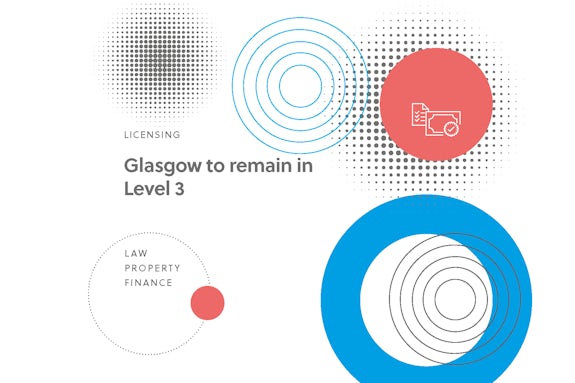Glasgow was dealt a hammer blow by the First Minister on Friday when she announced it would remain in level 3. There is much discussion about the real need for this given the statistics which are being relied on. Whilst it is clear that new variants will develop and more localised spikes will happen, meaning the Scottish Government will need to react to this, it makes it exceptionally hard for businesses to cope with an ever changing situation when those changes are announced so last minute. We all hear of the expected rush of customers and given the last 15 months, every business wants to be making sure that they maximise any potential benefits in welcoming customers back. Setting aside the science and politics behind Friday’s decision, the impact on everyone in the Glasgow area is huge, but more so for the licensed trade who had everything in place to open on Monday morning.
What is the impact and what can be done?
Twitter was awash with examples of huge orders which had to be cancelled at short notice, but what if cancellation of orders are in dispute? Suppliers were caught out by the announcement as much as the trade itself and they may also be in a position now of holding surplus, perishable stock. The key is to work together. Try to agree a reduction of orders rather than cancelling completely. Agree a cancellation fee or that a payment already made will be taken as a deposit towards a future order. If all else fails and you are being pursued to maintain an order you now cannot use, look at the terms and conditions and, if necessary, take legal advice.
Jo Millar, our head of Licensing says “While we know how difficult this whole period has been for the licensed trade, the Glasgow licensed trade in particular have been devastated by this recent announcement and clients are telling us how concerned they are about the huge impact it could have on their businesses due to the late notice. We have been so impressed by the trade and our clients and how they have regrouped time and time again through this crisis. Operators could use this time to carry out other checks and make sure all of their licensing paperwork and staff personal licenses are up to date. Check 2 hour staff training is complete and updates have been done. Make sure the manager named on your licence (designated premises manager or DPM for short) is still with you and check all personal licences are current – especially your DPM’s. If any personal licences are not up to date, or worse have been revoked or not renewed on time, now is the time to contact us to sort that out. Failure to do so could result in you having to stop selling alcohol now or in the future. We can assist with training, new personal licence applications, refresher intimations and personal licence renewals.”
Employees is another area of real concern – what happens with furlough and employees who have just been taken on by the business? While licensed trade businesses in Moray had some advance warning that they would be remaining within level 3, allowing them to keep staff on furlough leave and delay any suppliers or orders from coming in, businesses within Glasgow did not have that luxury.
If operators have other premises outwith Glasgow, it would be possible (subject to staff contracts providing for mobility) to deploy staff to another part of the business. This is only possible of the staff do not live in the Glasgow area as movement out with that area is discouraged. If staff have been taken off furlough to allow them to work on Monday, the benefit of flexible furlough is operators can place staff back on furlough leave (again, assuming that you have had all staff sign up to the operator’s flexible furlough scheme). The staff should understand that this is the business being forced to address the current situation.
Graham Millar, a Partner in Gilson Gray’s Employment team, says “We sympathise with the level of agility required in the current climate. The key to keeping your staff on side and ready to go is to ensure clear and transparent communication on a regular basis. We have seen a variety of different methods being used by employers, such as WhatsApp or other similar messaging apps. For me, it is not the way in which you communicate, but the fact of communication which is the key.”
If you are concerned about your current flexible furlough arrangements, or any terms and conditions you have with your suppliers, feel free to contact Jo Millar within our Licencing Team jmillar@gilsongray.co.uk or Graham Millar within our Employment Team gmillar@gilsongray.co.uk
The information and opinions contained in this blog are for information only. They are not intended to constitute advice and should not be relied upon or considered as a replacement for advice. Before acting on any of the information contained in this blog, please seek specific advice from Gilson Gray.








